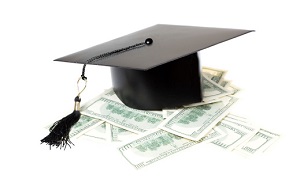Student loans are a serious debt problem for millions of Americans. Bankruptcy is designed to help provide relief for debtors who are struggling with overwhelming debt. However, in most cases, student loans are non-dischargeable in a bankruptcy proceeding. Debtors who desperately need assistance resolving their debt issues are not truly afforded a fresh start if a majority of their debt stems from student loans. This is why I am working to change the laws governing student loans in bankruptcy.
The Current Law
 Under current bankruptcy law, Bankruptcy Code Section 523(a)(8) states that student loans are non-dischargeable unless the debtor can prove undue hardship. This means the debtor must sue the student loan company in federal court to prove that repaying the student loans would cause an undue hardship for the debtor. Because the attorneys for student loan companies defend these suits vigorously, not many of these lawsuits are filed and, of those, very few are won. All too often Chapter 7 or Chapter 13 debtors still owe on their student loans after receiving their bankruptcy discharge.
Under current bankruptcy law, Bankruptcy Code Section 523(a)(8) states that student loans are non-dischargeable unless the debtor can prove undue hardship. This means the debtor must sue the student loan company in federal court to prove that repaying the student loans would cause an undue hardship for the debtor. Because the attorneys for student loan companies defend these suits vigorously, not many of these lawsuits are filed and, of those, very few are won. All too often Chapter 7 or Chapter 13 debtors still owe on their student loans after receiving their bankruptcy discharge.
I want to change the current laws in order to give debtors a true fresh start so that they can rebuild their finances. On April 2, 2014, I sent a letter to Senator Amy Klobuchar. She responded on April 25, 2014 and I forwarded my reply to her response on July 14, 2014. I have suggested that in addition to a debtor being permitted to file a Chapter 13 bankruptcy case to receive a standard discharge in 60 months that the bankruptcy code be amended to allow student loans to be discharged after an additional 60 months — a sort of super student loan discharge.
My Proposed Plan
The debtor would pay his or her bankruptcy plan payment during the first 60 months and all of their creditors, including those owning their student loans, would receive a pro rata share of the money. After 60 months, the remaining general unsecured debt (i.e. credit card debt, medical bills, etc. – what is currently covered in Chapter 13) would be discharged. At this point student loans would not be discharged; the debtor would continue to make monthly payments for an additional 60 months, which would be applied directly to the debtor’s student loans. After the additional 60 month period, any remaining balance on the student loans would be discharged or wiped out, tax free, forever! I truly believe that the Bankruptcy Code needs to be revised to provide relief to debtors suffering from student loan debt.
We are seeing far too many people with insurmountable student loan debt and little hope of ever being able to repay it. This overwhelming debt is a drag on our economy because many of these individuals cannot spend money beyond their student loans payments. The loss of purchasing power is enormous. Changing the Bankruptcy Code to include student loans in a repayment plan, based on what the debtor could afford to pay, will unleash them from this burden to allow them to get their life back. I believe it is of paramount importance for the debtor and for the economy.
The proposed change means that debtors can have hope of regaining financial control and that there will be an end to repaying student loan debt if they follow the new Chapter 13 bankruptcy rules.
We Can Help You If You Are Struggling with Student Loan Debt
Even though the current bankruptcy laws do not permit student loans to be discharged in most cases, bankruptcy can still help, specifically by dealing with your other debts. Request a free bankruptcy consultation to discuss your debts and relief options.



